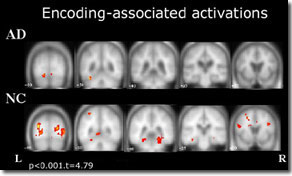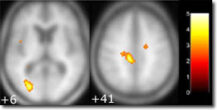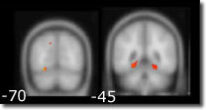 Alzheimer’s disease (AD), the most common cause of dementia in older adults leads to a deficit in declarative memory with relative sparing of implicit memory. This study uses fMRI to study the functional competency of specific brain regions and the relationship to the behavioral memory deficits in AD. We studied eight early-stage AD patients and eight healthy age-matched neurologically normal control subjects (NC) with fMRI at 3 Tesla during intentional memory encoding of scenes. The Alzheimer’s disease group demonstrated impaired explicit recognition memory, but intact implicit memory (repetition priming), for the scenes. Alzheimer’s disease patients demonstrated a graded deficit in activation for novel versus repeated scenes along the ventral visual stream, with most impaired activation changes in the mesial temporal lobe (MTL) and fusiform regions, most preserved activations in primary visual cortex and variably affected activations in secondary visual areas.
Alzheimer’s disease (AD), the most common cause of dementia in older adults leads to a deficit in declarative memory with relative sparing of implicit memory. This study uses fMRI to study the functional competency of specific brain regions and the relationship to the behavioral memory deficits in AD. We studied eight early-stage AD patients and eight healthy age-matched neurologically normal control subjects (NC) with fMRI at 3 Tesla during intentional memory encoding of scenes. The Alzheimer’s disease group demonstrated impaired explicit recognition memory, but intact implicit memory (repetition priming), for the scenes. Alzheimer’s disease patients demonstrated a graded deficit in activation for novel versus repeated scenes along the ventral visual stream, with most impaired activation changes in the mesial temporal lobe (MTL) and fusiform regions, most preserved activations in primary visual cortex and variably affected activations in secondary visual areas.
As demonstrated to the right, memory-associated activations (novel vs. repeated scenes) were reduced in AD patients relative to the NC group. This work investigates the source of these activation differences and the relationship to behavioral findings. Differential activation of particular brain regions seems to be associated with declarative and non-declarative memory processes in these groups.
Group-level correlations with behavioural measures of explicit memory were found in MTL, lingual and fusiform areas (top), whereas correlations with priming were found in lateral occipital, parietal and frontal areas (bottom). Together, these fMRI findings indicate a dissociation in Alzheimer’s disease between impaired explicit memory encoding in MTL and fusiform regions and intact implicit encoding in earlier-stage occipital cortex.

Novel – repeat; regression vs rt; p<0.01

Areas of brain activity correlated with better MMSE scores in AD patients.